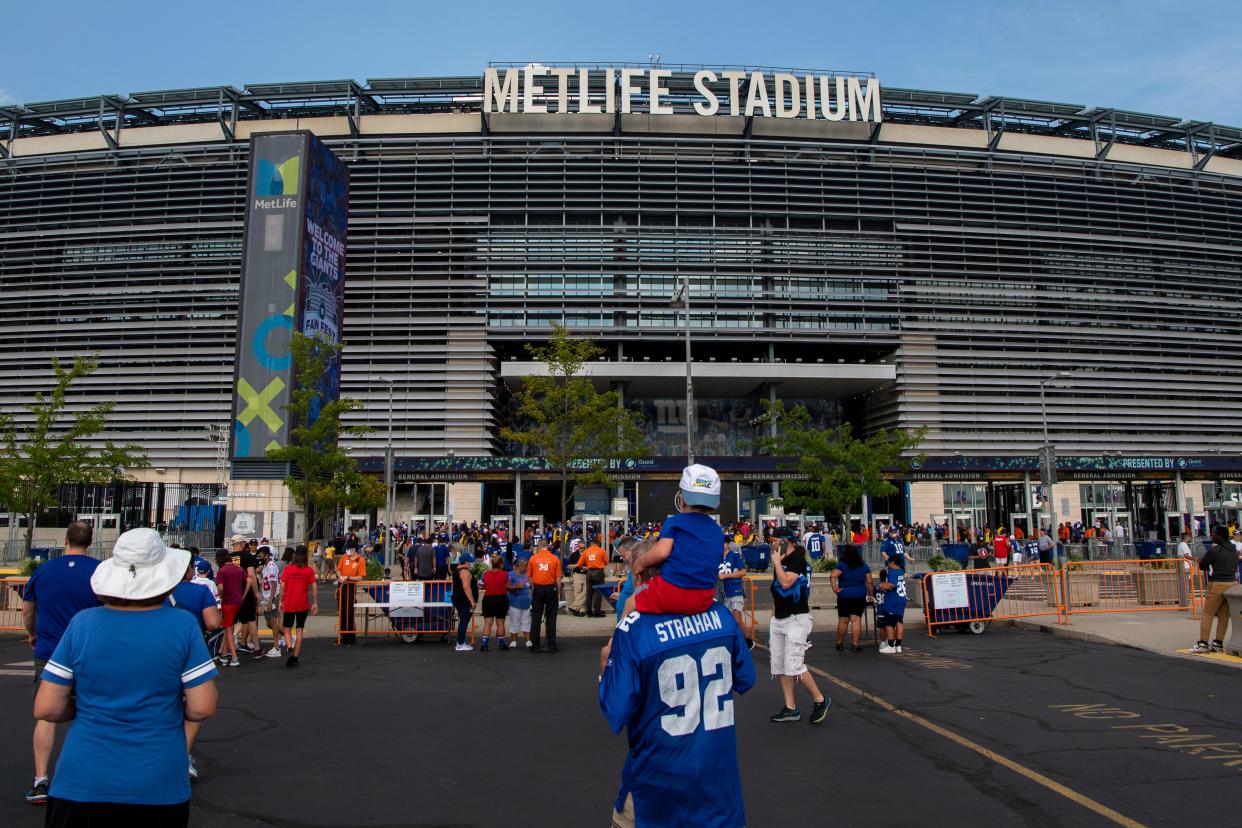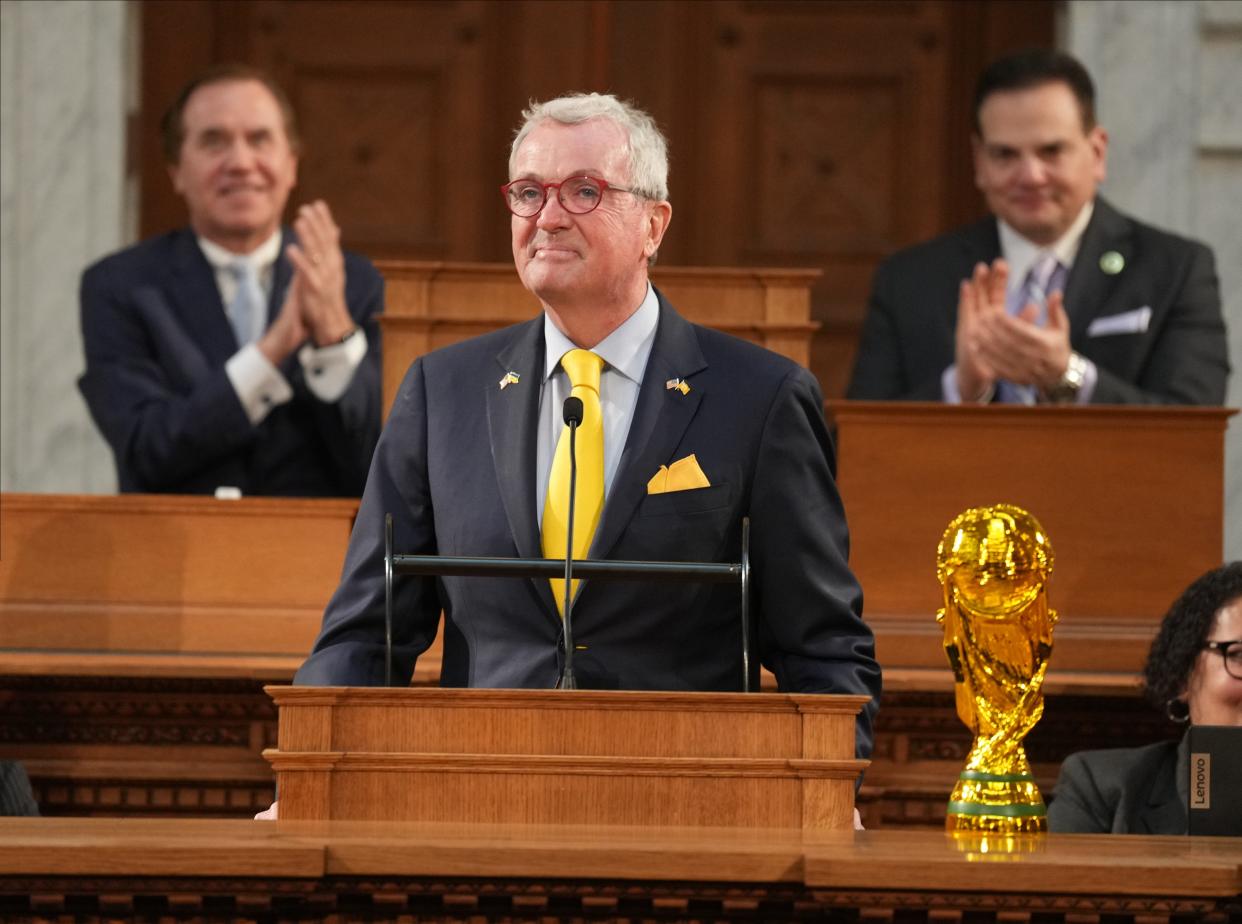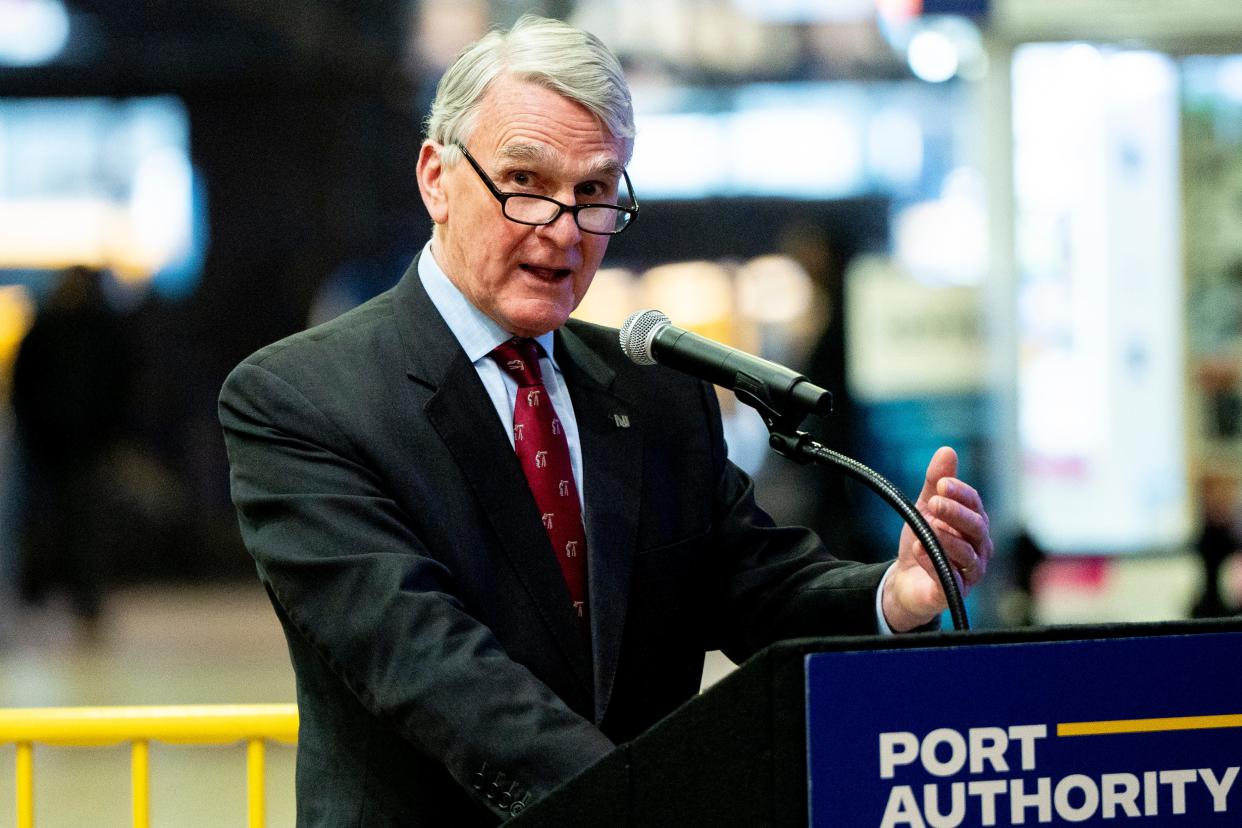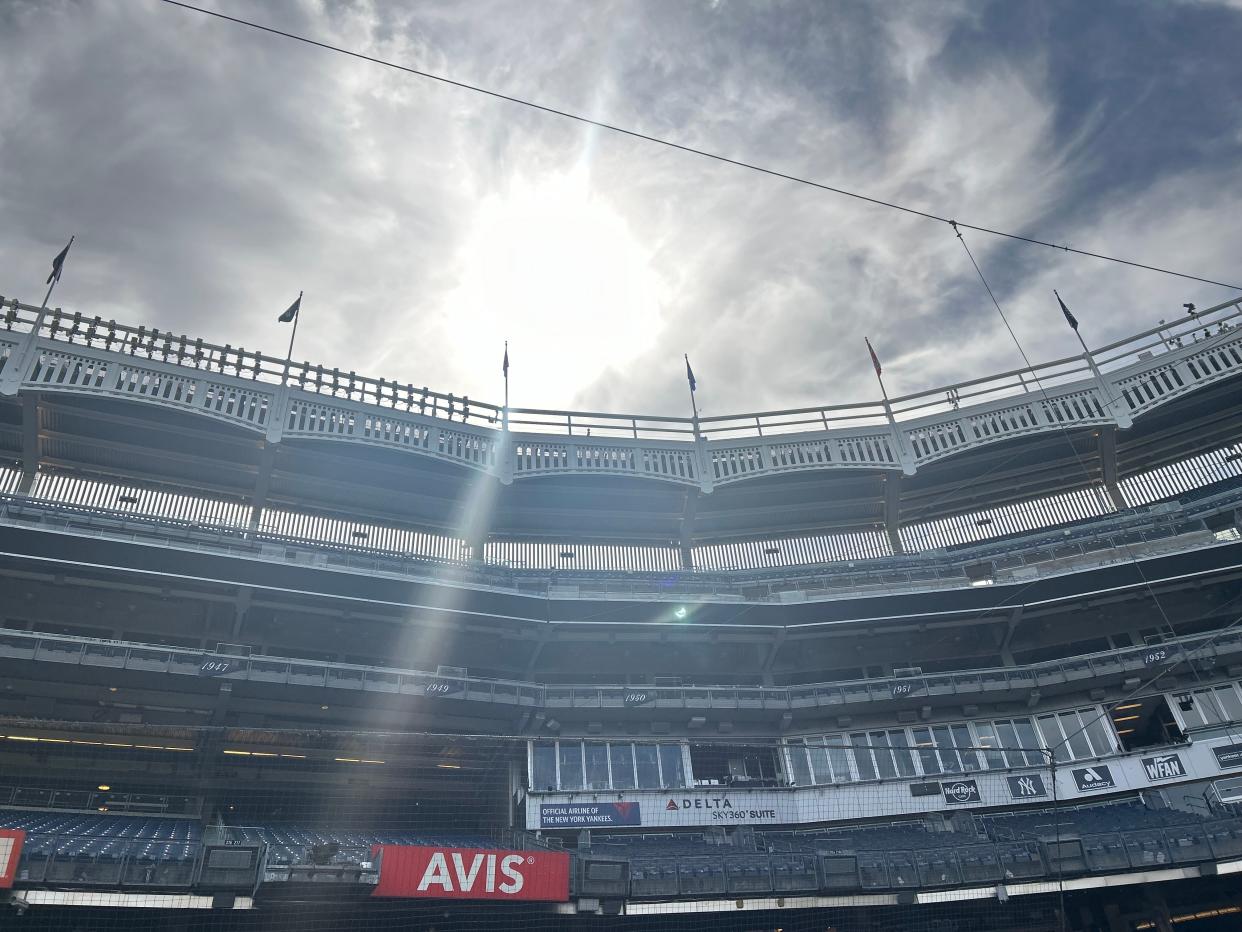Free transit? No tax collection? We got NJ contract to host World Cup. Here's what it says
New Jersey agreed to free public transportation for World Cup ticket holders — even as NJ Transit recently approved a 15% fare hike to plug budget deficits — possible state tax exemptions and numerous other potentially expensive state and local commitments, according to the contracts struck with FIFA to be a host city for the 2026 World Cup.
While state officials have spent the past few months highlighting the feat of luring the world's biggest sporting event to East Rutherford, little has been said about the actual contract bringing FIFA's World Cup to the Meadowlands.
NorthJersey.com obtained the contract and addendums after multiple public records requests were improperly denied or delayed, and only after legal counsel reached out demanding the documents, which should have been produced immediately under the state public records law.
These backroom deals determine what state and city taxpayers will be on the hook to pay for — costs that could easily balloon into hundreds of millions of dollars. These agreements can also dictate what state or municipal taxes may or may not be exempted; tax revenue is a way states try to recoup money for their hefty investments.
But chief among the outstanding questions is what the Garden State is estimating it will cost to foot the bill of state investments to host the final game of the biggest sports spectacle in the world and seven other matches of the tournament.
Mahen Gunaratna, communications director for Gov. Phil Murphy, referred all questions about the contract and the estimated cost to Natalie Hamilton, the administration's press secretary, who did not answer emailed questions.
There was no response from Jim Smith of New Jersey Transit, or Brian Aberback of the New Jersey Sports and Exposition Authority, either. The latter agency is responsible for the Meadowlands sports complex and all events there.
A spokesperson for FIFA — which is expected to rake in billions of dollars in revenue and earned a historic $7.5 billion from the 2022 World Cup in Qatar — said the organization continues to “collaborate closely with our host city partners” and are working to “identify opportunities that make sense to move forward like, for example, working with all the host cities on optimizing the transport offering by looking at costs, benefits and host city best practices.”
The host committee for the portion of the tournament to be played at MetLife Stadium said they expect the final and seven other matches scheduled to be played in East Rutherford to “generate over $2 billion in economic impact and will support over 14,000 jobs.”
They went on to say they are “proud that our hosting efforts will lean heavily into private and corporate sources."
The committee is still working with FIFA and other regional agencies regarding hosting requirements. The Murphy administration confirmed there are currently no state tax exemptions.
Other cities have been more up front about their arrangements with FIFA. Seattle, Toronto and Santa Clara in California already publicly released their 2018 initial agreement and 2022 addendums with FIFA, the Switzerland-based governing organization orchestrating the world’s biggest sports spectacle in 14 cities in the U.S., Canada and Mexico in 2026.
Toronto officials are now putting estimates to host six games at $380 million, up from the prior estimate of $300 million and well more than $45 million originally projected in 2018.
A tricky part of advanced planning for large-scale, international events like the World Cup or Olympics is that the contracts are negotiated and amended over the course of multiple political cycles.
The NJSEA president — appointed by the governor — is the signatory for the state on the FIFA contracts. The first version was signed in 2018 by Wayne Hasenbalg, an appointee of Gov. Chris Christie. The 2022 addendum was signed by Murphy appointee Vincent Prieto. More recently, Paul Juliano signed the amendments.
By the time matches begin, Murphy will be out of office and a new administration will be six months in, managing the tournament and operations — plans they had little to do with.
Surrendering the right to collect taxes
As part of the bidding process for the tournament, the international soccer organization requested the governing bodies in each host city “provide a limited tax exemption to FIFA and to certain third parties involved in the hosting and staging of the competition.”
Story continues after video
Though the subsequent contracts don’t spell out any specific state tax breaks, they do note that those involved “shall cooperate in good faith to minimize nonrefundable taxes, duties and levies in line with applicable legislation and practice.”
What that means for New Jersey is still unclear — but it could have implications for whether the state can collect on a variety of taxes, such as sales, income and corporate business taxes.
The contract also stipulates that “all taxes, duties and levies” imposed on FIFA, its subsidiaries or the U.S. Soccer Federation are the responsibility of New York City and the NJSEA, which operates the MetLife Stadium complex in East Rutherford, where several World Cup games and the final championship game will be played.

FIFA, its subsidiaries or the U.S. Soccer Federation would also be able to avoid any municipal taxes and regulations.
Admission to sporting events in New Jersey are subject to a 2% sports and entertainment facility tax rate in addition to the 6.625% sales tax rate, for a total rate of 8.625%.
Officials have said New Jersey has not waived any state sales tax that would be applicable on World Cup tickets, but at a recent event Bruce Revman of the NYNJ Host Committee said the “stadium does not have any control of the tickets. They don't sell them. They're not responsible for them. That will all come through FIFA.”
Revman also said tickets will go on sale to the general public in the summer of 2025 and the match schedule won’t be announced until December 2025, so people are “committing before the match schedule is revealed.” Tickets often sell out in hours.

Missouri, Florida and Georgia preemptively passed legislation to bar those state governments and local municipalities from collecting sales taxes on tickets to attend the 2026 World Cup matches — decisions made before being chosen as hosts for some of the games.
In Missouri, general revenues could be reduced by $240,710 to $481,421 and total state revenues could be reduced by $339,000 to $678,001 per match, according to documents prepared by the state’s budget office.
Seattle, meanwhile, said that "at this time we do not anticipate requesting any specific tax exemptions from local, state, or federal governments," according to April Putney, chief strategy officer for the Seattle International Soccer Local Organizing Committee.
NJ Transit, MTA and fan fests
The NJSEA and New York City will have to implement a transport strategy and, according to the contract, will include free public transport on match days for ticket holders “mainly from and to stadiums, airports, railway stations, hotels and other touristic areas as well as the locations selected for the FlFA Fan Fest.”
They will also have to provide special access lanes with police escorts for teams, FIFA representatives, VIP guests and others, and may be asked to “restrict public access, or close public access completely, to any roads within the host city.
Seattle and Toronto agreed to make public transportation free on match days for ticketholders and Fan Fest visitors along with extended service hours. Both cities as well as Santa Clara also agreed to special access roads to the stadiums.
However, FIFA may no longer require host cities to provide public transportation for free.
"While there is no longer a contractual requirement for free transit services, it is still a goal we hope to achieve locally to maximize sustainable transportation," said Putney, the representative from Seattle's local organizing committee.

FIFA said the free transit requirement is among those from 2018 that it is loosening in an effort work with the host cities, though the contract has not been amended to reflect that.
New Jersey has spent $35 million to design a new dedicated bus lane to shuttle ticketholders between MetLife and Secaucus Junction station, but the cost to construct that and a bus terminal at the stadium and to purchase additional vehicles for the route are not yet known.
NJ Transit is expected to serve as a primary source of transportation for a potential Fan Fest site at Liberty State Park in Jersey City and other events around the region. This will require significant resources and money — a particular challenge for an agency in the throes of historic deficits — to provide adequate and expanded service for the month that games will take place in New Jersey to serve regional events and regular commuters.
On top of that, an estimated 6 million visitors could flock to the area to celebrate America’s 250th birthday on July 4, 2026 with an international parade of tall ships expected to sail through New York Harbor.

For Kevin Corbett, president and CEO of NJ Transit, shuttling fans to the matches is not his biggest concern — it's being able to serve the greater region at the same time.
"We’re getting more definition on the Fan Fest down at Liberty," he said. "For me, that kind of stuff is more of a concern right now than the stadium.
"There’s going to be a lot of other stuff if you’re not a soccer fan — how do we make sure that we don’t drop the ball for FIFA and all the fans who are coming from around the world," Corbett said. "That’s something we really want to drill down in over the coming months."
No other 'major sporting events' allowed
Much like in FIFA's contract with Seattle and Toronto, the New Jersey contract dictates that there can’t be any other “major sporting event” from seven days before the opening match to seven days after the final matches.
The region also can’t promote any other major sporting events in the area a year before the tournament, and no other “substantial cultural events” such as concerts that “draw together large numbers of people” from one day before a match day to one day after a match day. The exception to that are events approved by FlFA, though the organization has also backed off on these requirements, too.
Limiting major events in the New York City region is nearly impossible.
Beyond the estimated 6 million visitors who could flock to the region for the nation's 250th birthday on July 4 in 2026, the North to Shore musical festival takes place in late June that year in New Jersey cities, including Newark in the New York metro area and Atlantic City, which is just an hour outside of another host city, Philadelphia.
It’s also a time when professional baseball is in full swing in the Bronx and Queens. Both Citi Field and Yankee Stadium were mentioned as regional assets in the pitchbook put together as part of the initial bidding process.

The contract also says that New York City and the NJSEA will have to make their “best efforts” to make public facilities and public spaces “as attractive as possible” — and at their own expense “carry out the respective beautification measures, in particular temporarily covering and decorating construction sites as much as possible at important locations.”
Police, fire and emergency service departments within the region will be responsible — at no cost to FIFA — for “the overall safety and security of the competition” and related events, such as Fan Fests, according to the agreements with Seattle, Toronto, Santa Clara and New Jersey.
In the run up to the tournament, FIFA wants free office space for 10 FIFA employees in close proximity to MetLife Stadium, New York City or another similar location acceptable to FIFA until the end of the tournament. If they decide to establish the headquarters office in the area, they would need office space in the New York City area for 30.
Contract amendments show that FIFA will have access to all of the suites in MetLife during the tournament.
The contract also dictates the requirements for inside the stadium. About $30 million of state funds has been set aside to make changes to MetLife Stadium, including a two-phase process to modify four to 10 rows of seats so they can be rearranged to widen the field for the soccer matches.
The MetLife sign and more than 1,000 branding materials around the stadium will need to be covered up.
Is it worth it?
The lengthy and, at times, onerous requirements may have played a part in narrowing which cities would play host to games.
Chicago, Minneapolis and Glendale, Arizona dropped their bids in 2018 to be considered as host cities for the World Cup because of too many unknowns, financial costs and an overall feeling that the benefits would not outweigh the risks.
"FIFA could not provide a basic level of certainty on some major unknowns that put our city and taxpayers at risk," Matthew McGrath, a spokesman for Chicago Mayor Rahm Emanuel, said in a statement at the time of the decision. "The uncertainty for taxpayers, coupled with FIFA's inflexibility and unwillingness to negotiate, were clear indications that further pursuit of the bid wasn't in Chicago's best interests."

Montreal also dropped out in 2021 after not receiving more financial assistance to cover estimated costs to host the event, which doubled from $50 million to $103 million in fewer than three years.
There is a precedent for FIFA’s expectations when it comes to these exemptions.
Russia revised its tax codes to accommodate FIFA demands when it hosted the World Cup in 2018, exempting a 15.5% to 20% corporate business tax and income tax, which could have been applied to the winnings for teams and players paid out in prize money, according to EisnerAmper, an international audit and accounting firm. The country lost out on an estimated $80 million from the exemption of the corporate business tax, after spending more than $52 billion to host the tournament.
FIFA, its partner confederations and associations, broadcasters, suppliers, contractors and service providers were “fully exempt from taxes” in Qatar, where the 2022 World Cup was hosted, according to the accounting firm KPMG.
Germany, South Africa and Brazil made similar tax accommodations when they hosted the games in 2006, 2010 and 2014, respectively, forfeiting hundreds of millions of dollars in potential tax collections.
This article originally appeared on NorthJersey.com: Here's what NJ can and can't do under World Cup contract
